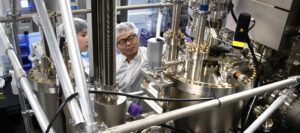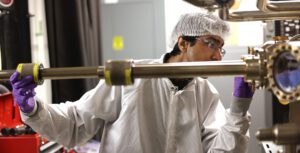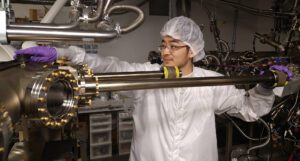Yoo is making memory devices more flexible and tunable, making them irresistible for modern AI applications.


Yoo is making memory devices more flexible and tunable, making them irresistible for modern AI applications.

Prof. Zetian Mi’s team proved the viability of a reconfigurable, ScAlN/AlGaN/GaN ferroelectric HEMT transistor that is critical for next-generation communication and computing systems
The algorithm uses direct muscle measurement, with the potential to seamlessly support a user who switches between walking and running
The post Responsive ankle exoskeleton algorithm handles changes in pace and gait appeared first on Michigan Engineering News.

The tool is expected to advance the study of exciton dynamics, which could help identify new research directions for clean energy and information technology.

Navid’s research is focused on artificial photosynthesis and optoelectronics using III-Nitride based semiconductor materials.

Xiao has been working on several projects in Prof. Zetian’s Mi’s group, including micro LED technology and renewable energy.
New research shows that a VPN can be one tool in an internet user’s toolbox but often is not sufficient as the only solution for all privacy needs.
The post Are VPNs really the answer? appeared first on Michigan Engineering News.
Photonic fibers borrow from butterfly wings to enable invisible, indelible sorting labels.
The post A “game changer” for clothing recycling? appeared first on Michigan Engineering News.
Led by Prof. Becky Peterson, the research focuses on a category of materials important for low power logic operations, high pixel density screens, touch screens, and haptic displays.
The post Scalable method to manufacture thin film transistors achieves ultra-clean interface for high performance, low-voltage device operation appeared first on Michigan Engineering News.
Dr. Mehdi Saligane, a leader in the open-source chip design community, was among the first researchers to fabricate a successful chip as part of Google’s multi-project wafer program.
The post Open-source hardware: a growing movement to democratize IC design appeared first on Michigan Engineering News.